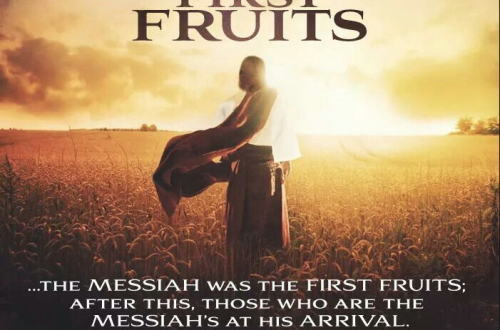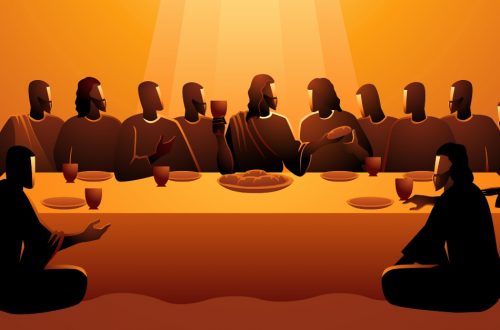Good News – Hosea 14
About Hosea
Hosea prophesied near the end of the Northern Kingdom (before 722 BC). In earlier chapters God tells him to take an adulterous wife. Later God causes them to reconcile. Whoredom is often used in scripture to illustrate idolatry. When the people aren’t faithful to God, they “whore” around with false religion. Through Hosea God proclaims the impending fall of Israel. Even so, the lessons of Hosea are for all ages. Going beyond political reconciliation of Israel after its fall, as seen in the rebuilding of the Temple in Ezra’s era, Hosea depicts the greater reconciliation of man to Himself poetically and profoundly in Chapter 14.
About Hosea
Hosea prophesied near the end of the Northern Kingdom (before 722 BC). In earlier chapters God tells him to take an adulterous wife. Later God causes them to reconcile. Whoredom is often used in scripture to illustrate idolatry. When the people aren’t faithful to God, they “whore” around with false religion. Through Hosea God proclaims the impending fall of Israel. Even so, the lessons of Hosea are for all ages. Going beyond political reconciliation of Israel after its fall, as seen in the rebuilding of the Temple in Ezra’s era, Hosea depicts the greater reconciliation of man to Himself poetically and profoundly in Chapter 14.
The Good News of Hosea 14
The Good News is the theme of this entire chapter. Rather than pick out one verse and dwelling on it, let’s look at each verse and watch as the Good News unfolds before our eyes…
Hosea 14:1 Return, O Israel, to the Lord your God, for you have stumbled because of your iniquity. YHWH is asking his lost sheep to return to Him. He’s letting them know they’ve stumbled and gotten lost because of a common problem, sin. Paul gives a similar warning when he explains all men have sinned and fall short of the glory of God (Ro 3:23), and that the wages of sin is death (Ro 6:23).
Hosea 14:2 Take with you words and return to the Lord; say to him, “Take away all iniquity; accept what is good, and we will pay with bulls the vows [or: pay the fruit]of our lips. YHWH tells us exactly what to do to begin to return to Him. He says we need to use our tongues and speak words. He tells us to pray and gives us an example of what that prayer should consist of. The phrase “take with you words” means the words must come with the soul. Another way of saying this is you must speak from your heart, not merely give lip service. To return to the Lord also means turning away from your sin and your false idols (false beliefs of all sorts). We need to ask God to remove the bad and take the good. This means we must ask for spiritual cleansing and subsequent redemption. Jesus said, “Come, follow me.” God then tells us we need to promise to pay with our lips. In other words, confess Him as Lord (Ro 10:9).
Hosea 14:3 Assyriashall not save us; we will not ride on horses; and we will say no more, ‘Our God,’ to the work of our hands. In you the orphan finds mercy.” God is a jealous God. You can have no other before him. That includes things made by your hands (Ex 20:4-5) and it means not putting trust in our salvation in the hands of other humans (Ps 118:8). Salvation comes only by God (Eph 2:8-10). In this verse God says very plainly we aren’t to put faith (for salvation) in people who are over us and we are to say with word and deed we don’t put faith in the work of our hands. The sentence “In you the orphan finds mercy” suggests we are to admit before God and men that it is only through recognizing our lost orphan condition that we can be adopted by God by His tender mercy. To do this requires a contrite heart. The way God says these things shows a compassion on the part of our Lord we have no right to expect, but every reason to gratefully accept.
Hosea 14:4 I will heal their apostasy; I will love them freely, for my anger has turned from them. God has unlimited capacity for emotion. Just as He has unlimited anger and wrath, He also has unlimited grace and mercy. Our tendency to wander off from our shepherd is like a disease of the soul, but YHWH promises to heal us of this disease. Like the truly good shepherd who may grow weary and even angry with wandering sheep, He still does the holy right thing by turning from the anger to gather those sheep back to Himself. Even though we find salvation, when we wander He promises to remain faithful and seek our return. We can receive healing.
Hosea 14:5-6 I will be like the dew to Israel; he shall blossom like the lily; he shall take root like the trees of Lebanon; his shoots shall spread out; his beauty shall be like the olive, and his fragrance like Lebanon. Dew comes with the dawn and represents cleansing, refreshing, and reinvigoration of life. Here God is promising to be the source of life to Israel and, by extension through Christ, all the children of Abraham who believe in YHWH whether born Jewish or adopted as gentile Christians. The dew seems to represent eternal life in much the same way John refers to the Water of Life (Rev 22:17). What could be more fragrant to the soul than such refreshment?
Hosea 14:7 They shall return and dwell beneath my shadow; they shall flourish like the grain; they shall blossom like the vine; their fame shall be like the wine of Lebanon. The promise is clarified here. Believers will come and dwell in the presence of God (Rev 22:3). In the meanwhile the number of believers will grow and be extensions of the vine (Jn 15:5).
Hosea 14:8 O Ephraim, what have I to do with idols? It is I who answer and look after you. I am like an evergreen cypress; from me comes your fruit. Returning to the earlier theme, God once again reminds us that He has nothing to do with idols. He reminds us it is Him alone who is our shepherd and it is He alone to whom we should give praise and worship. His comparison to the evergreen illustrates His perpetual solidity. He tells us that it is through Him alone we bare any good fruit (Gal 5:16-26).
Hosea 14:9 Whoever is wise, let him understand these things; whoever is discerning, let him know them; for the ways of the Lord are right, and the upright walk in them, but transgressors stumble in them. Hosea ends with a word of cautionary hope. The caution is to be wise, for those who refuse to admit God is God and submit to His divine authority will stumble on His words. They won’t understand and will be combative toward Him. Strife isn’t of God, but from disharmony with God’s Will. The wise will hear. The wise will listen attentively to God and trust Him to be right. Beyond admission and submission, the hearing trusting believer will commit himself to doing whatever God asks of them. To be a witness of this good news must compel a person to testify through word and deed. If you know the Good News, you must let others know (Mt 5:14). It isn’t just words, it’s a way of life – eternal life.


